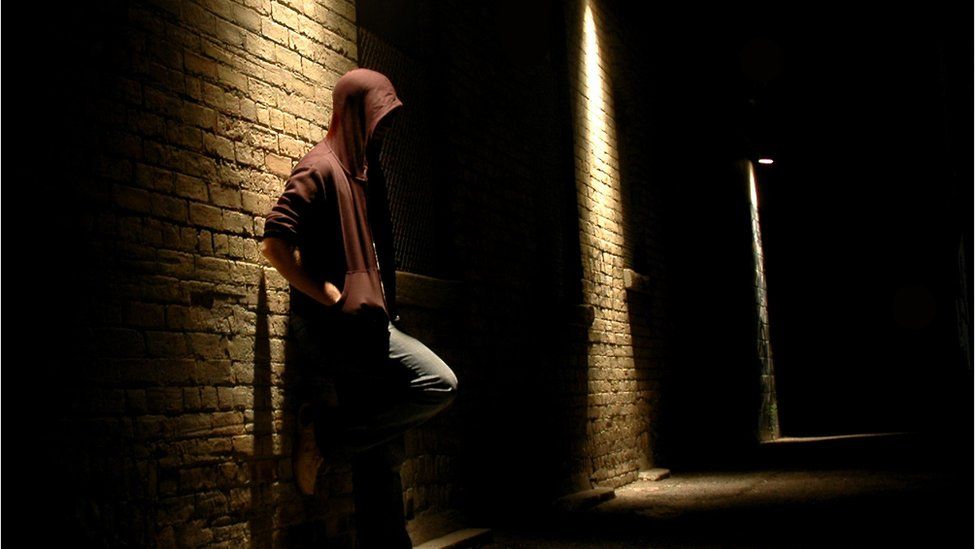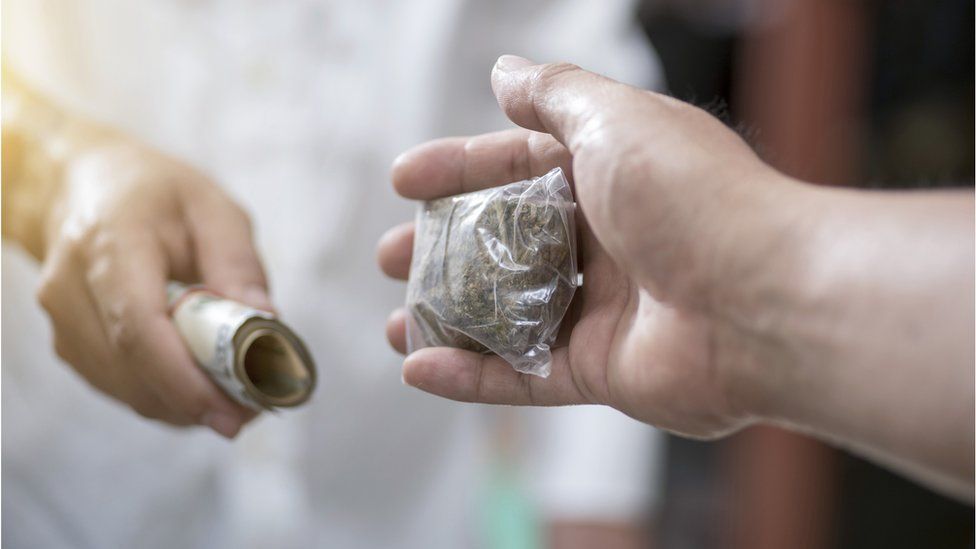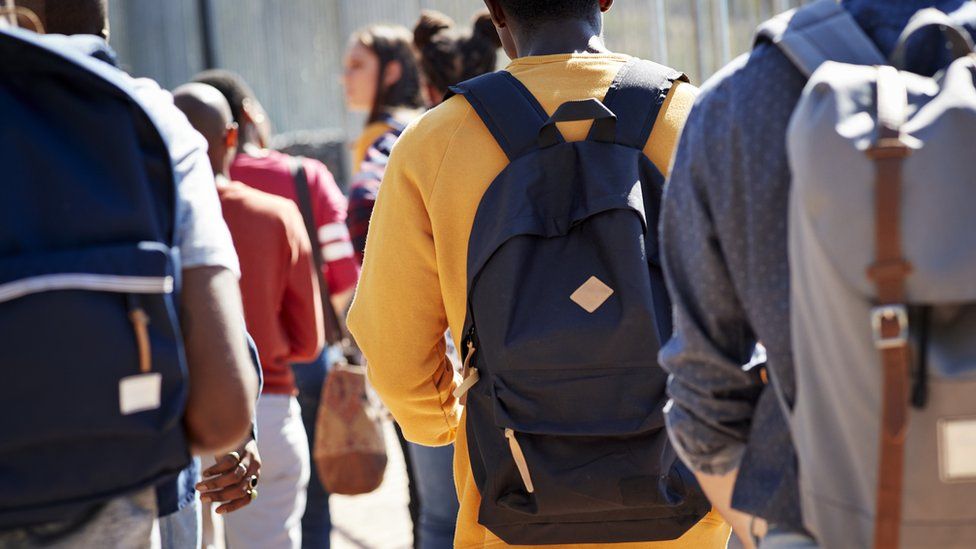 Getty Images
Getty ImagesA university student says he felt forced to break the law to earn enough money to afford his degree.
Working multiple jobs alongside his course at Swansea University, Tyler realised he couldn’t get the degree he wanted unless something changed.
With no family support, the 24-year-old says he thinks more support should be given to those from poorer backgrounds wanting to go to university.
A Swansea University spokesperson said students have access to financial aide.
With both parents in prison, Tyler, whose name has been changed to protect his identity, and his younger brother were cared for by their grandparents to ensure they were kept together.
However, this relationship grew sour as the boys grew older.
- Lockdown ‘causing drugs gangs to recruit locally’
- Crisis cash for students doubled last year
- Poverty is Wales’ major challenge, warn officials
“I made a mental decision when I was like 16 that the only way that I can actually be myself and be my own person is to go to university. So that’s what I did,” said Tyler.
He found it difficult to juggle his course while working enough hours to afford his rent and food costs.
In his first summer at university, Tyler returned to his grandparents’ home but after an argument about money for a train ticket, he was cut off.
“I was told if you leave the house, don’t ever come back. So that’s what happened. I left the house at 18,” he explained.
“It was literally the worst night of my life. I’ve never felt so mentally, physically tired from a day’s events.”
He returned to university as an “independent student” and applied for support.
Students are classified as independent for multiple reasons, including if they are permanently cut off from their parents.
This means they don’t have financial or emotional support.
Those in the care system receive more support than those who are independent, said Becca Bland, chief executive and founder of the charity, Stand Alone, which offers support services to prevent estranged adults becoming vulnerable.

There is support available for independent students at many universities.
Tyler said: “I did get hardship funds, which did help a lot. But I think at 18, 19, 20 years old, a grand without much in the way of financial planning is only good in the short term.”
While Swansea university offered him financial management sessions, he said he felt he had no time to take them up on it as he was juggling so many jobs and the degree.
However, even with the extra support, Tyler found it “stressful” to manage.
Because he had no guarantor for his student accommodation, Tyler had to pay double the deposit of other students, which set him back about £800 before each year began.
“I had to be in a job. Otherwise I couldn’t afford to eat or pay rent. That was the reality,” he said.
“I remember thinking when I was working these rubbish jobs that when I graduate and get behind a desk wearing a shirt and tie – I am never going to complain.”
In his third year, he had to repay a bank loan he had taken out when he first became an independent student.
“I realised the best way for me to get £800 a week was to sell drugs,” he said.
“Dealing drugs was the only way I could afford my degree.”
‘I didn’t have anyone’
Asked whether he considered the consequences of his actions on other people, he said he justified it to himself as a temporary means to and end.
“I didn’t really think of the impact as I was only selling weed to students. I imagine some people didn’t prioritise their studies but I never found it a moral conflict.
“Had it been coke, I would have felt different for sure.”
With two parents in prison, Tyler said he used to wonder what that meant for him.
“You hear when you’re younger that if you’re the child of someone that goes to prison, you’re more likely to go to prison,” he explained.
“The odds weren’t in my favour. If you look at the statistics, every statistic says I should be dead or in prison or on the streets.
“I think that a lot of children of people who go to prison go to prison themselves because there’s no infrastructure when they need it.
“I didn’t have a mum, a dad, an uncle, anyone when I was 18.”
Waking up at 07:00 to get his university work finished by 15:00, Tyler would spend the next nine hours dealing cannabis.
“At the time I was just like: ‘If I have to go to prison or something, that’s just the way it is’. Which is a harsh reality.”

When he decided to start dealing, Tyler said he always planned to stop after he graduated.
“It makes me sad I had to jeopardise my degree to sell drugs,” he added.
Miraculously, Tyler was never caught.
Graduating with a degree, Tyler almost immediately found a job in technology marketing, and now earns about £40,000 a year.
“This was always my plan. I never saw it as some big criminal enterprise, I’m not an idiot. I just wanted to get my money and move on.
“I’m in bed by 22:30, which is blissful compared to doing what I was doing at uni. I’m as happy as I can be,” he said.
“I came out the other side. Most people either stay selling and get themselves in prison or they become like coke addicts and get themselves into debt. I was neither.
“My job now is to make sure if I have a kid or if I know a kid… they never have to go through that situation. That for me would feel like I didn’t get away with it.”
Ms Bland, of Stand Alone, said: “The crippling cost of overpriced student accommodation and low amounts of statutory student support mean that such students are heavily reliant on bursaries and university generosity to live.”
Students who have been missed by the care system and are estranged from family are the poorest and most vulnerable students in the system, according to Ms Bland.

“Research shows that family support has become increasingly important for young people who want to succeed in Higher Education in Wales today,” she said.
“I would never say that dealing drugs is an answer to financial hardship, and students who are entertaining the idea that this is a way to square the financial circle need to think very carefully about the consequences of getting involved in criminal activity.
“This could well have a huge impact on their future life, and isn’t something that will go away if they are caught. The stakes are high.”
Students who are struggling should approach their university and find out what support is available, she Ms Bland said, and that if there was no support, students could defer the course to work more.
“Prolonging your degree might not seem like a desirable option, but it is much more desirable than the consequences of dealing drugs and ending up being arrested and charged.”
With the cost of living crisis, more people in wider society are taking “enormous risks” by selling drugs to “purely survive”, according to Rob Barker, of Barod Cymru, an organisation which tackles drug and alcohol problems.
“There is also a significant risk more people will use a range of substances to try and help them with increasing levels of stress and anxiety associated to the current crisis,” he said.
“While we would not advise people to undertake such behaviour and wish to highlight the risks involved, we do identify with the reasons as to why some people may take such actions and that desperate situations can sometimes result in desperate measures.
“We would encourage anyone who is struggling with the current cost of living crisis to get in touch with the relevant services.”
A Swansea University spokesperson said it provides tailored advice, opportunities and information to students estranged from their parents.
This service can also signpost and refer estranged students to support services and employability opportunities.
Students suffering financially can also access the Estranged Students’ Bursary, hardship funds and money management and budgeting sessions, the university added.
- If you or someone you know has been affected by the issues raised in this article, information on how to access help and support is available via BBC Action Line.
-
Poverty is Wales’ major challenge, warn officials
-
1 November 2022

-
-
Crisis cash for students doubled last year
-
1 July 2022

-
-
How much will university cost me?
-
26 August 2022

-
